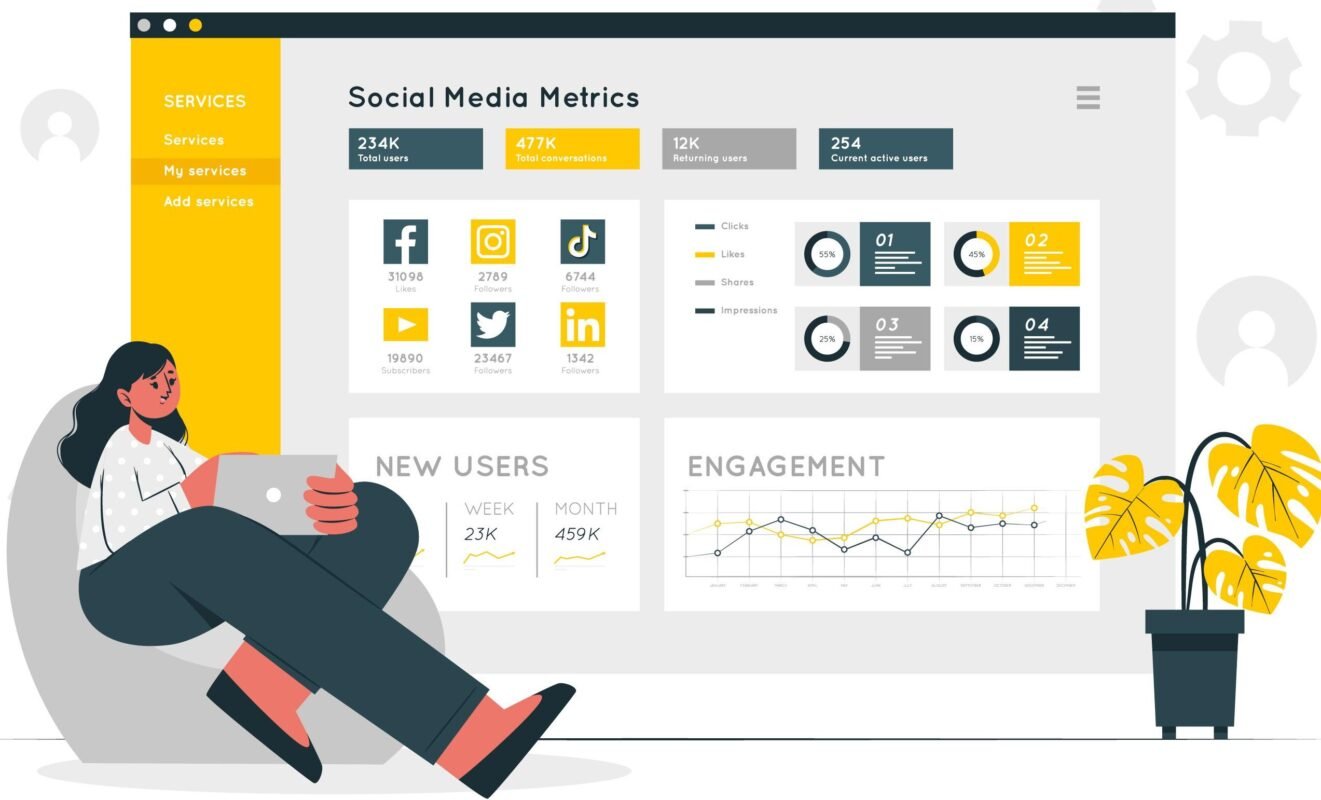Social media marketing refers to the practice of using social media platforms to promote a product, service, brand, or organization. It involves creating and sharing content, engaging with users, and running targeted advertising campaigns to reach a specific audience. Social media marketing is a powerful tool for businesses and individuals to build their online presence, increase brand awareness, drive website traffic, generate leads, and ultimately boost sales.
It does not matter if you run a local shop or a big national company. Social Media Marketing is quite beyond just a trend. It’s an important piece of your business-promoting strategy. Social media platforms will assist you to connect together with your customers, increase awareness with reference to your business, and boost your leads and sales. However, you need to begin with an always-on mindset and a solid Social media marketing and content marketing strategy.
If individuals don’t realize your business, they can’t become your customers. Social media marketing boosts your visibility among potential customers, holding you reach a good audience by employing a great amount of your time and energy. And it’s absolved to producing a business profile on all the most important social networks; therefore you have got nothing to lose.

Here are 5 key aspects and strategies used in SSM:
- Establishing goals: Before diving into social media marketing, it’s important to set clear goals. Whether it’s increasing brand visibility, driving website traffic, or growing a loyal customer base, defining your objectives will help shape your strategy.
- Target audience research: Understanding your target audience is crucial for effective social media marketing. Research their demographics, interests, behaviours, and preferences to tailor your content and messages to resonate with them.
- Choosing the right platforms: There are various social media platforms available, such as Facebook, Instagram, Twitter, LinkedIn, YouTube, and Pinterest. Identify the platforms that align with your target audience and business goals, and focus your efforts on those.
- Content creation: Creating high-quality, engaging, and relevant content is essential for social media marketing success. This includes images, videos, articles, infographics, and other formats that capture attention and encourage sharing.
- Content distribution: Once you create content, you need to distribute it effectively. Plan a content calendar and schedule posts at optimal times for maximum visibility and engagement. Utilize features like hashtags, tag relevant users, and collaborate with influencers to expand your reach.
Remember, social media marketing is not just about self-promotion. It’s about building genuine connections, providing value, and engaging with your audience. By creating a solid strategy and consistently delivering valuable content, you can leverage the power of social media to achieve your marketing goals.
Customers are gradually savvier and more knowledgeable about which businesses they support. Before making a decision, they’ll do a quick search to browse your website and social media platforms. Social media play a significant role in networking and communication platform. With the assistance of these platforms, making a voice for your company is vital in raising the brand image. Customers appreciate the actual fact that once they post comments on your page, they receive a changed reply instead of a computerized message. A brand that values its customers, takes the time to compose a private message that is perceived naturally in a very positive light.

One of the other advantages of Social Media is that it also helps increase your website traffic. By sharing your content on social media, you are giving users a purpose to click through to your website. On your social media account, the more quality content you share, the more inward traffic you will generate while making conversion chances.
Social media marketing offers numerous benefits for businesses of all sizes and industries. Here are some key advantages:
- Increased brand awareness: Social media provides a platform to reach a large audience and increase brand visibility. By consistently sharing engaging content and interacting with users, you can raise awareness about your brand and its offerings.
- Targeted audience reach: Social media platforms allow you to define and target specific demographics, interests, behaviours, and locations. This enables you to reach a highly targeted audience, increasing the chances of attracting potential customers who are more likely to be interested in your products or services.
- Improved customer engagement: Social media fosters direct communication and engagement with your audience. You can respond to comments, messages, and mentions, providing personalized interactions and building stronger relationships with your customers. This engagement can lead to increased customer loyalty and advocacy.
- Content distribution and amplification: Social media platforms provide a channel to distribute and amplify your content. When users engage with your posts, share them, or tag others, your content can reach a wider audience beyond your immediate followers. This helps to expand your brand’s reach and attract new customers.
- Drive website traffic and generate leads: By strategically including links to your website in your social media posts, you can drive traffic to your site. This can result in increased lead generation and conversions, as visitors have the opportunity to explore your offerings and take desired actions on your website.
- Cost-effective advertising: Social media platforms offer various advertising options that are often more cost-effective compared to traditional advertising channels. You can set specific budgets and target parameters, ensuring your ads are seen by the right audience. This enables smaller businesses with limited marketing budgets to compete and achieve significant results.
- Competitive advantage: Establishing a strong social media presence can give you a competitive edge. When consumers research brands or products, having an active and engaging social media presence can help you stand out from your competitors and build trust with potential customers.
- Market insights and customer feedback: Social media platforms provide valuable insights into consumer behaviour, preferences, and trends. You can monitor conversations, gather feedback, and conduct sentiment analysis to better understand your target audience. This information can be used to refine your products, services, and marketing strategies.
- Partnership opportunities: Social media allows you to connect and collaborate with influencers, other businesses, and industry leaders. Building relationships with key influencers can help expand your reach and tap into their followers’ trust and loyalty. Collaborating with complementary businesses can also lead to mutually beneficial partnerships and cross-promotion opportunities.
- Measurable results and data analysis: Social media platforms offer analytics tools that provide detailed data on your campaign performance, audience demographics, engagement rates, and conversions. This allows you to track the effectiveness of your marketing efforts, make data-driven decisions, and optimize your strategy for better results.
By leveraging the benefits of social media marketing, businesses can enhance their online presence, engage with their audience, drive website traffic, and ultimately achieve their marketing objectives.



